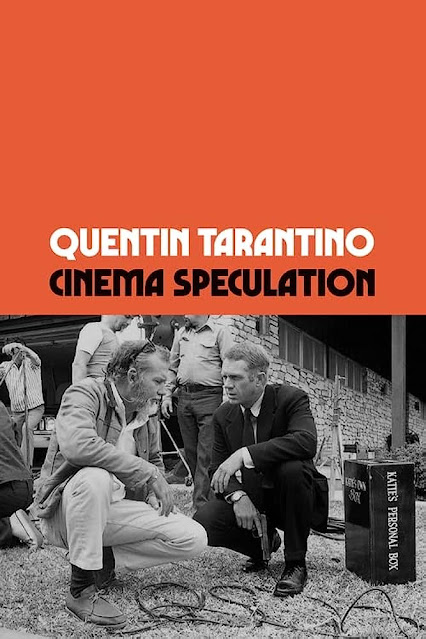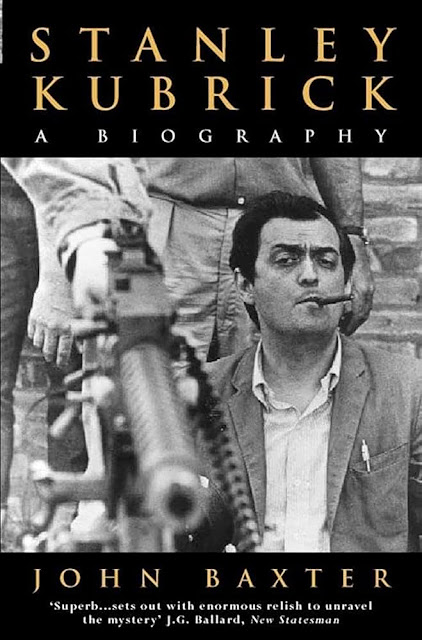Watching Movies With Quentin Tarantino
Cinema Speculation is the first non-fiction book from Quentin Tarantino, the writer-director of Reservoir Dogs (1991), Pulp Fiction (1994), Django Unchained (2012) and Once Upon a Time in Hollywood (2019), among others. Tarantino is easily one of the best-known and most inimitable film makers working today, but he's also known for being a hardcore film nerd.
Cinema Speculation explores some of the films of Tarantino's favoured 1970s era and interweaves this with some of his personal moviegoing reminiscences from his childhood and early adulthood.
The book's early section explores his cinema experiences as a young boy, being taken by his mother to see such inappropriate films of the time as Dirty Harry (1971), Everything You Always Wanted to Know About Sex (1972) and Deliverance (1972). Unsurprisingly, for those familiar with his own oevre, it was the violent films that little Quentin enjoyed the most, with many obviously leaving a deep impression on him.
The bulk of the book is taken up by chapters devoted to a selection of these films from the late sixties up until the early eighties, with Tarantino sharing his thoughts on each one, his impressions of what's good about them - and often about what isn't - his own ideas about casting, and sometimes comparisons with the films' original source material.
This includes comparisons between James Dickey's novel Deliverance and John Boorman's 1972 film version, and discussion of Donald Westlake's "Parker" novels (written under the name Richard Stark) and the films they inspired, including Point Blank (1967) and The Outfit (1973).
What's a little surprising about the book, and even disappointing, is how limited in scope the selection of films here actually is. All of those chosen for examination are American films, almost all date from the 1970s (with only two exceptions), and most of them are at least moderately violent crime films of one kind or another.
A man who appears to have seen as many films as Tarantino, and with his habit of plundering the unloved and obscure films of this era for his own work, could be expected to write about some genuine obscurities. But there isn't a 'D' grade Italian war movie knock-off or a cheap and cheerful kung fu film to be seen - nor barely any other exploitation film worthy of the name.
Instead, the films explored are mostly very well known - Bullitt, Dirty Harry, The Getaway, Deliverance, Taxi Driver, Rocky and Escape from Alcatraz, among others - and Tarantino generally covers quite familiar ground. The least well known are perhaps the horror film The Funhouse and Rolling Thunder. The latter is a "revengeamatic" as he calls it, from the post-Death Wish era, when audiences were eager to see people get pushed too far and take revenge by blowing some bad guys away.
The only real surprise inclusion is Peter Bogdanovich's much-maligned 1974 film Daisy Miller, although this is admittedly covered in much less detail than other titles here (not enough shooting probably), and Tarantino mainly considers the question of the controversial casting of Cybill Shepherd in the lead role.
In compensation, within those chapters Tarantino does range relatively widely, also taking in the careers of some of the actors and directors involved and throwing in some of his own cinemagoing reminisces as well. The chapter on the Tobe Hooper horror film The Funhouse, for example, doesn't really get into discussing that film until Tarantino is about nine pages in.
There's also an appreciation of second string LA Times film critic Kevin Thomas, whose championing of 'B' grade pics and exploitationers could give a young film maker a career boost in the industry. On the other hand, Tarantino's got it in for James Bacon, who is more than once referred to as a "fat hack".
The book's biggest piece of actual cinema speculation comes in a brief chapter considering how different Taxi Driver might have been if it was directed by original choice Brian De Palma instead of Martin Scorsese.
It's in writing about Taxi Driver that Tarantino becomes particularly exercised about race - although it does tend to be a recurrent theme in the book. He is particularity critical of the casting of Harvey Keitel as what he calls a "unicorn" white pimp. This was apparently in place of screenwriter Paul Schrader's black version, at the insistence of nervous studio execs, thus eliminating the film's racial angle altogether.
There's an unexpected final chapter where the author discusses Floyd, a thirtysomething man and would-be screenwriter, who rented a room in his mother's house for a year when little Quentin was growing up. Floyd was the only adult Tarantino knew who knew as much about the movies as he did. And it was apparently his unproduced script for his dream project, Billy Spencer, an epic western with a black hero, that sort-of-inspired Tarantino's own Django Unchained decades later.
There's one very brief, but crass, cringey bit in this chapter that put unwelcome images into my head, but otherwise all this stuff about Tarantino's childhood and adolescent years is entertaining. As are the glimpses he gives into a different, pre-video and pre-streaming world, when wanting to rewatch a favourite movie often meant having to follow it around town as and when it reappeared in cinemas, as QT does repeatedly with Rolling Thunder.
You get the impression that Tarantino's knowledge of seventies cinema also encompasses the porn films of that era, given the umbrage he takes at elements of Paul Schrader's film Hardcore, and his professed familiarity with even gay porn movies of this time. Perhaps Tarantino's next book could be a treatise on the seventies "golden age" of the American porn film ("Cinema Masturbation"?).
Tarantino does have his quirks as an author. As you would probably expect, even in print he swears a lot, in the way that nerds often do when they're trying to sound cool. But given his films, that's only to be expected. He also likes to italicize things. Not only film and book titles, but TV episodes, character names (although not consistently), cars, sometimes fictional places, occasionally film companies and the names of people he grew up with - and this might sometimes cause confusion between what is a film or book title and what isn't.
Despite very occasional cack-handed bits of phrasing, Cinema Speculation is generally nicely written in an informal, conversational style and it makes for an easy read - even if the idiosyncratic ideas and film readings are often very arguable. The book is Tarantino unfiltered, which admittedly does sometimes mean unfocused, discursive, even a bit rambling. But it's also full of the author's obvious enthusiasm for crime films and thrillers of the 1970s era. He shows a deep love and knowledge of American cinema of this period, right down to the less familiar character players and the forgotten starlets. And anyone wondering just where Tarantino developed his film-making preferences and sensibilities will find most of those questions answered here.



I'm so glad to see your write-up on this book, Jay -- I'm a huge Tarantino fan, and although I heard about this book earlier this year, I promptly forgot all about it. It certainly doesn't sound like a perfect read (and I really want to know about that crass and cringy section you referenced!), but I think I will check this one out. Maybe he stuck to better-known films because most people would be interested in those. I'd love to know his takes on some of the more obscure titles, though. Ah, well -- maybe there will be a volume 2. Thanks for this first-rate review, and for adding to my future purchases!
ReplyDeleteI would also like to have seen some less well known films, including some of the films he has championed in the past, like Twisted Nerve or Long Weekend. I assumed he would be enthusing over some trashy exploitation films that everyone else has forgotten, but no. Maybe Rolling Thunder is the closest. The approaches he takes to some familiar films can be interesting, though, especially with the experience of having seen them with an audience when they were new.
DeleteI'm not a big fan of Tarantino, but I do share his enthusiasm for all things '70s. It's my favorite film era (I was born in the late 1960s). I truly miss how brave and bold American filmmakers were during those years.
ReplyDeleteThe retreat to safety in the 80s is why QT sees it as one of the worst decades for American films. He's very down on almost everybody, with only rare exceptions (like The Thing or Cruising).
DeleteOne thing he does talk about is how much of a downer so many 70s films were and he captures very well why Rocky was so big, because, just for once, the little guy with a dream didn't get totally crushed.
This comment has been removed by the author.
ReplyDeleteI was a bit surprised too how many of his selections were pretty well-known films but I am glad that he at least talked about the stars and filmmakers careers and his opinions on their overal works as well. Would love to read more filmmakers' spectulate and rant almost unfiltered on the films they grew up on.
ReplyDeleteThat would be great. A lot of directors must have similar stories about the films they grew up with and how their taste in films was formed.
DeleteFabulous you reviewed this book.. on my to read pile. It does sound a good read, and I loved your balanced thoughts on it. Thanks..
ReplyDeleteThanks, Gill. I Hope you like it.
DeleteI'm not really a fan of Tarantino. He is a hit-and-miss with me. But I share his passion for all things '70s, the best decade of cinema in my opinion (I don't agree with him about '80s, though). I always enjoy listening to him talk about movies, so I'm interested in reading the book. Tarantino isn't an erudite, he is simply a man who knows what he likes. P.S. Happy to hear that he took the time to talk about Funhouse, which I like a lot.
ReplyDeleteI'm not a huge fan of Q. Tarantino or many 70s flicks, but he probably has a lot of interesting observations, and those are always worth reading.
ReplyDeleteTrue. But if you're not into QT or 70s films then it may not be for you.
DeleteHope you have time to join...
ReplyDeletehttps://weegiemidget.wordpress.com/2024/06/18/news-announcing-the-aaron-spellingverse-blogathon/